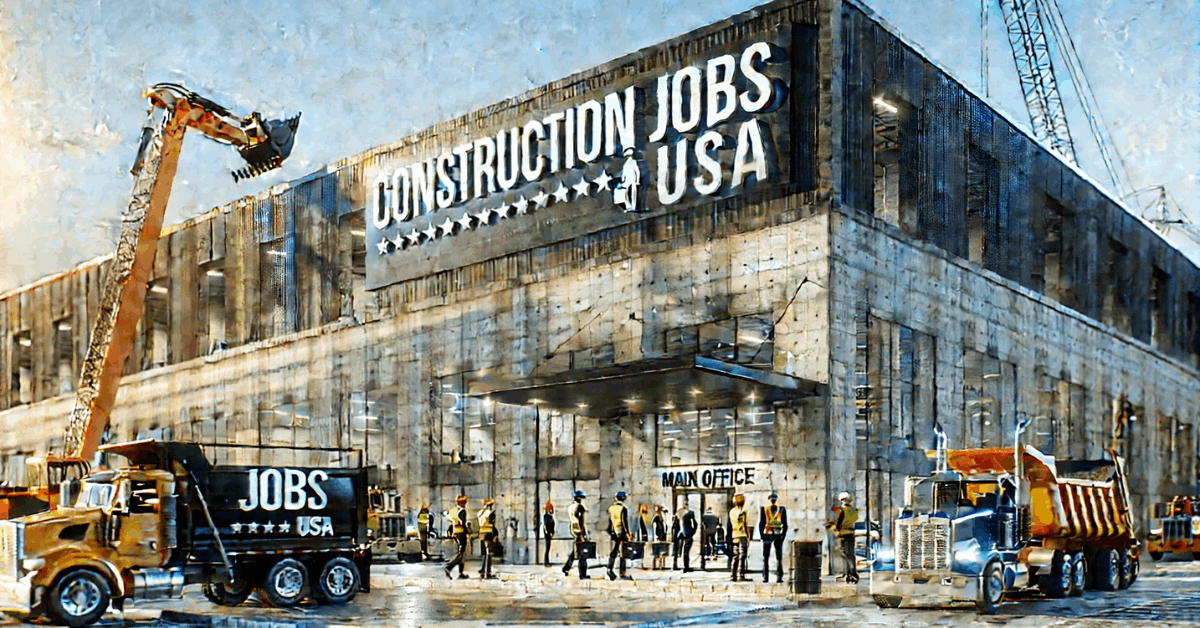Many people want steady work and good pay, and construction offers both. This article will show you how to apply for construction jobs and get started the right way.
You’ll learn where to look, what skills help, and how to stand out. The goal is to help you build a solid and lasting career in the field.
Overview of Construction Work in the U.S.
The construction industry in the U.S. is one of the largest job markets. It covers housing, roads, bridges, and commercial buildings.
Many roles don’t need a college degree. You just need the right skills and training.
Most projects need both general labor and skilled workers. Growth is steady, and demand stays high across many states.

Types of Construction Jobs Available
There are many roles, from basic labor to specialized work. Here are some of the most common types:
- General Laborers
- Skilled Trades (electricians, plumbers, carpenters, welders)
- Heavy Equipment Operators
- Site Supervisors and Foremen
- Safety Inspectors
- Civil Engineers and Project Managers
Basic Requirements and Eligibility
You need to meet some basic conditions before applying. These depend on the role and location.
Minimum Age and Legal Work Status in the U.S.
You must be at least 18 years old for most jobs. Legal work status is also required. Employers may check your documents. Make sure you have valid ID and work papers.
Physical Fitness and Ability to Work Long Hours
You’ll need to lift heavy items, stand, and move all day. Work may involve hot, cold, or noisy places.
Some roles need climbing or working at heights. Endurance and strength are important.
High School Diploma or GED
Many entry-level jobs don’t require a diploma, but some do. Skilled or supervisory roles may prefer it.
A diploma also helps with training programs. If you have one, include it in your resume.
Specific Certifications or Licenses – OSHA, Forklift, CDL
For better chances, get certifications like OSHA 10/30 or a forklift license. A CDL is needed for driving trucks or equipment.
These can be done through short courses. It shows you’re trained in safety and rules.
Where to Find Construction Job Listings?
You can find open roles in several trusted places. Always check for legit and updated listings.

Online Job Boards
Search on sites like Indeed, ZipRecruiter, and Glassdoor. Filter by city or skill. You’ll find many listings with contact info. Set alerts to track new jobs.
Company Websites
Big companies post jobs on their own sites. Check Bechtel, Turner Construction, or Skanska. You can apply directly. This avoids middlemen.
Staffing Agencies Specializing in Labor and Trades
Some agencies focus only on construction staffing. They match you to jobs based on skill. You’ll often find short-term or contract work. Walk-ins are accepted in many branches.
Local Union Halls and Apprenticeship Programs
Unions help workers get jobs and training. Visit their local office or site.
Ask about current openings or apprenticeships. These are common in trades like plumbing or carpentry.
Government Infrastructure Projects
Check USAJOBS or local city sites. They post public projects often. Some offer good pay and benefits. These jobs also tend to be more stable.
How to Prepare a Strong Application?
To get hired fast, your application must show your skills clearly. Keep things short and direct.
Write a Clear and Short Resume
List only your job-related skills, past work, and training. Add how many years you’ve worked in labor or trades.
Mention any machines or tools you’ve used. Highlight your safety training.
List Safety Training and Equipment Experience
Here’s what to include if you’ve used tools or finished training:
- OSHA 10/30 certification
- Forklift operation or boom lift use
- CPR and First Aid training
- Welding, carpentry, or plumbing tools
Add References or Work History
If you worked before, name your past company. Add the dates and duties briefly.
Give a phone number for your boss or foreman. If no experience, say you’re eager and ready to learn.
Customize Applications for Different Roles
Don’t send the same resume to every job. Match your resume to the job posting. Mention the tools or tasks listed in their ad. This shows you read it and know the work.
How to Apply – Step By Step
Follow these steps to submit your application. It helps you stay organized and avoid delays:
- Search for jobs by location or skill level
- Check job requirements carefully
- Submit resume and application online or in person
- Prepare for a possible interview or skills assessment
- Follow up politely if needed
Interview Tips for Construction Jobs
You don’t need to say much in an interview, but what you say should be clear and confident. These tips help you show you’re ready and dependable:
- Wear clean and appropriate clothes
- Be honest about your skills and experience
- Show you understand safety and teamwork
- Be ready to talk about availability and physical tasks
Entry Through Apprenticeship Programs
An apprenticeship is paid, hands-on training for new workers. You earn while learning from experienced people.
Trade schools and union programs offer most of them. They teach real job skills that lead to full-time roles.
Many people start in plumbing, carpentry, or electrical trades this way. It’s a smart choice if you have no experience.
Certifications That Improve Your Chances
Adding a few certifications to your resume helps you stand out. These show that you know how to work safe and follow rules:
- OSHA 10 or OSHA 30 certification
- First Aid/CPR certification
- Forklift or equipment operation licenses
- Trade-specific licenses (electrician, HVAC, welding)
Career Growth and Long-Term Path
You can start small and grow your career over time. Laborers can become foremen or supervisors after gaining experience.
Skilled workers can get licensed and earn more. With extra training, you may join big projects or lead teams.
Some even become contractors or start their own business. Progress comes with time, effort, and a safety focus.
Expected Salary and Benefits
Pay depends on skill and role. Most jobs also offer basic benefits:
- Entry-level laborers: $14–$20 per hour
- Skilled trades: $20–$35+ per hour
- Supervisors/Project Managers: $60,000–$120,000+ per year
- Common benefits: Health insurance, 401(k), paid time off, training, union protections
Challenges and How to Prepare?
Construction work is not always easy. Prepare for these situations:
- Working in hot, cold, or noisy areas
- Heavy lifting and long hours
- Traveling to different job sites
- Following strict safety rules at all times
- Handling weather delays or tight schedules
Final Words: Start Strong in Construction Jobs
Construction jobs offer steady pay and real growth. To get hired, you need to apply smart, train well, and show you’re reliable.
Use trusted job sites like Indeed, ZipRecruiter, or USAJobs. Start now and take the first steps toward a solid, long-term career.











